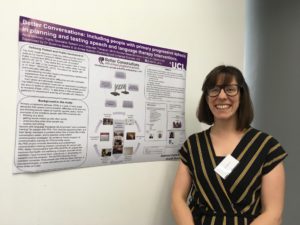Getting to the nub of the issue: Involving people who are living with dementia

ENRICHEnabling Research in Care Homes
GUEST BLOG
Getting to the nub of the issue: Involving people who are living with dementia
Anna Volkmer, Speech and Language Therapist/NIHR Doctoral Research Fellow, University College London
Anna completed her undergraduate speech and language therapy degree at UCL, in 2002, before embarking on a career working in neurological conditions, such as dementia. In this blog post, she outlines how patient and public involvement has strengthened her PhD project.

As a clinician I have always considered the patient or client I worked with and their families members as part of the team. Involving them in their own care, i.e., setting goals and choosing an appropriate intervention together, was a no-brainer. It seems logical as the intervention was ultimately all about them. So, consulting with a group of people with primary progressive aphasia to discuss and plan my research project seemed natural. It almost felt like the tables were turned – they were supporting me to set goals and offered alternative ideas to support me in planning my intervention approach.
Patient and public involvement (PPI) formed a large section of my grant application form for my PhD. On asking for advice on what this section should include I was surprised when I was informed this section should explain how you as a researcher have consulted with people with primary progressive aphasia themselves. I was surprised to have to write down that I had been ‘listening’ to people during clinical practice (!?). Doesn’t everyone listen to their patients. Isn’t most clinical research based on what people want and need? However, as I continued this work I have realised that PPI is much more than just listening. PPI means that people with primary progressive aphasia critique, develop, and direct the research toward the route it really needs to travel. Truly this is their project not mine.
People with primary progressive aphasia and their families have really enhanced my research. I have realised how important it is to have an informed alternative perspective on my work. I have found people have provided ideas I had not previously considered. I have also found I have really enjoyed discussing the project with people who are enthusiastic and engaged. It sometimes feels that my steering group have been a sort of cheering squad, who provide me with the energy, but also a different view of the ‘pitch’. They compliment my project.
However, I have to say engaging people with primary progressive aphasia and their families has also been a slightly challenging experience. I have found the same group of people who have been my biggest fans have also been my biggest critics. The first time this happened I had a moment where I found it rather confronting. However, within the same conversation I realised that this constructive criticism was so incredibly valuable. A research project can only truly develop when it is viewed and considered and “worked on” from all angles. I have now learned to embrace this – for people would generally not bother to give me these suggestions unless they felt the project was worth it! I truly believe my research project is even more worthwhile with all these contributions.

Anna Volkmer is currently completing her PhD at the Department of Psychology and Language Sciences at University College London. For more insight into her work and to engage with Anna, you can follow her on Twitter at @volkmer_anna
This article first appeared in Anna’s personal blog and has been reposted here with Anna’s permission.